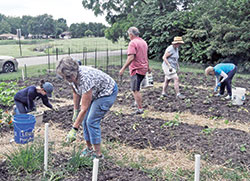Growing community: Ecumenical gardening initiative will help brothers, sisters in need

Members of St. Barnabas Parish and Friedens United Church of Christ, both in Indianapolis, work together on June 12 in a garden on the grounds of the Friedens faith community. The produce from the garden, sponsored by St. Barnabas, will be given to people in need who come to a food pantry at St. Anthony Parish on the near west side of Indianapolis. Members of St. Barnabas help operate the pantry. (Photo by Sean Gallagher)
By Sean Gallagher
Ivy Logsdon walks amid rows of sprouting vegetable plants in a garden on a warm June evening. He pulls weeds here, gives advice to other gardeners there.
He doesn’t let the fact that he’s 88 slow him down in doing something that is close to his heart and a part of his faith.
“I have a passion for gardening. I love to see things grow,” Logsdon said.
For him, planting seeds, tending plants and harvesting what grows is also an act of faith.
“I see the works of God in creation. I really do,” Logsdon said. “When you plant a seed, it’s a creation. You take one little tomato seed and you can get bushels of tomatoes off of it. And then you have seeds for the next year if you save them.”
In addition to growing green beans, peas, cucumbers and peppers, Logsdon is also helping to nurture a community.
He and other residents of a neighborhood on the south side of Indianapolis are working together to grow a vegetable garden to help people in need.
Logsdon is a member of St. Barnabas Parish in Indianapolis, which sponsors the garden. It’s a cooperative project with the nearby Friedens United Church of Christ, where the garden is located. Members of both faith communities work in the garden, as well as neighborhood residents that aren’t members of either church.
The vegetables produced in the garden will be given out at a food pantry at St. Anthony Parish on the near west side of Indianapolis, a pantry that St. Barnabas Parish helps operate.
“We welcomed this opportunity to engage in a very practical way that benefits the common good,” said Rev. Marc Hayden, Frieden’s senior pastor. “We also have projects related to hunger relief. So, this was a natural for us.
“And the idea of partnering with St. Barnabas, for us, really warmed our hearts. We’re glad to have St. Barnabas as a neighbor.”
Phyllis Jensen, a longtime Friedens member, spoke about the garden as she worked alongside Logsdon and other gardeners.
“I think it’s great,” said Jensen of the ecumenical cooperation between the two faith communities. “We’re so proud that St. Barnabas is doing this.”
While Logsdon oversees the work done in the garden, fellow St. Barnabas parishioner Connie Merkel makes sure that Logsdon has the supplies he and other gardeners need.
Merkel helped get the project off the ground. She lives near both St. Barnabas and Friedens, and saw that Friedens had a garden plot on its campus that was unused.
She also helps lead St. Barnabas’ efforts at the food pantry at St. Anthony, and wanted to offer its clients more fresh produce than it’s able to do at present.
She spoke with Friedens’ leadership about the possibility of using the garden. They were happy in their approval and invited Merkel to speak about the garden at two of Friedens’ worship services. This led to members of the congregation volunteering to assist with the effort.
Merkel describes the various circumstances coming together to make the garden a reality as a “prompting of the Holy Spirit.”
“It’s been very exciting and rewarding from that perspective,” she said.
The common faith in Christ that the St. Barnabas and Friedens communities profess is reflected through rows of flowers in the middle of the garden that form the shape of a cross. Although adding beauty to the garden, the flowers also serve a practical purpose by attracting bees to help with pollination of the plants growing there.
Like Logsdon, Merkel is also pleased at the way the garden has become a way to bring people together in the south side neighborhood.
“We started because we wanted the produce,” she said, “and that’s still a valuable commodity of what we’re doing. But I think what has become more exciting and more fulfilling in some ways is seeing the community.” †
